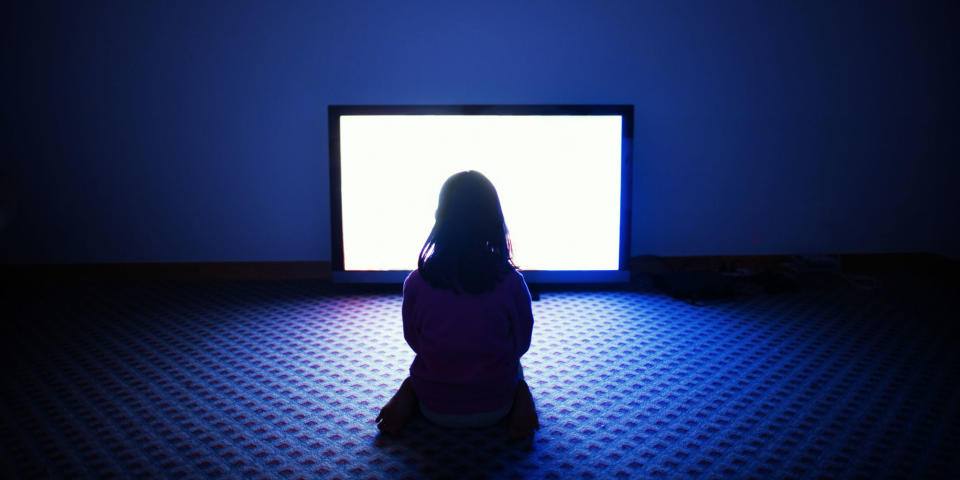My 6-Year-Old Is Obsessed With National Tragedies — and I Doubt She's Alone

After a recent family dinner, I poured myself a glass of wine, waved the white flag, and told my persnickety daughters they could watch an episode of I Am Frankie before showering - except then the TV wouldn't turn on. My husband, Rick, put on his amateur electrician's hat and got it to power up, only to realize the batteries in the remote control were dead.
While he went to hunt for some fresh ones, talking heads on CNN revealed new timeline details that had emerged in the investigation following the Las Vegas massacre. Vivian, 6, pointed to the image on the screen and said excitedly, "That's the place where we went!"
Indeed, we'd stayed at the Delano Hotel inside the Mandalay Bay last year. (Little kids seem to have a way of remembering shiny gold windows.) The content of the newscast gave away nearly everything I'd been attempting to keep from her for days.
"Somebody shot all those people?" Vivian asked. "Why? Who was it? Did mommies and daddies die? Did kids die? Will they miss school? Did the police come? Is the man in jail?"
I called to Rick to hurry with the batteries, except when he came down and changed the channel, Vivian protested
"Turn it back," she said. "Is this happening now? Is this for real life? Why can't we watch it?"
A year ago her interests weren't much broader than gymnastics and Nickelodeon. But then 2017 happened. During the presidential election last fall, Rick and I had pretty strong opinions, though we did our best - at least initially - to play it cool around Vivian and our other daughter, 9-year-old Eleanor.
"We need to respect other people's choice to support a candidate with whom we disagree," we'd tell them diplomatically. That changed abruptly with the release of the pussy-grabbing tape, at which time we loudly changed our tune. ("He doesn't respect women so we just can't respect him." "He's not a nice man or a good person." "Yes, sometimes it feels appropriate to hate someone.")
Since the election, Vivian and Eleanor have mostly grown accustomed to having NPR, ESPN, and the Weather Channel on in the background. When the headlines are particularly gruesome, though, Rick and I will change the channel or switch topics.
But lately, it's practically impossible to go outside, online, open a newspaper, or turn on the TV and not have to pick your jaw up off the floor over an international crisis, natural disaster, or a national tragedy. We do our best to shield our kids from the worst of it, but ever since they learned to listen, talk, and read, it's silly to think we can shield them completely from scary headlines; the bubble wrap we encase them in at home can't protect them from the grim realities of the outside world. Besides, trying to restrict bleak stories can be like playing a game of whack-a-mole.
Trying to restrict bleak stories can be like playing a game of whack-a-mole.
If we tell her no CNN on Saturday mornings, Vivian opts for "20 Animals That Will Kill You" on National Geographic. She asked a Salvation Army worker if he also thinks it's wrong that Trump won't allow people who were born men but feel like women to serve in the military. She told the supermarket cashier who asked if we wanted to donate a $1 to the Red Cross that one of her grandmas lives in Louisiana where sometimes police officers are shot, and that friends of ours just moved to Houston and didn't have lights in their house during Hurricane Harvey.
As it turns out, the struggle of having a child consumed with bad news is hardly unique to our family.
Before November 9, 2016, politics and other current events weren't ubiquitous topics in her clinical consultation room. But these days, Candida Fink, a board-certified adolescent and child psychiatrist in New Rochelle, New York, says what's happening in the news is now a near-constant source of anxiety and depression for many of her patients.
"Kids of all ages, races and nationalities, from different socioeconomic backgrounds, those who are gay, bisexual and trans, have expressed specific worries, like, 'What am I going to do? What's going to happen to my rights?'" Fink says. "Families are even telling me of a new way in which siblings are insulting one another: by referring to the other as 'Trump.'"
Young adults, teens, tweens, and even little kids are feeling increasingly uneasy and despondent at what's happening both at home and oceans away. But the news cycle is also affecting how kids treat others. Ever since our nation's Tweeter in Chief has made name-calling great again, Fink has seen an uptick in bullying in the schools where she consults.
"When it happens at the highest levels," she says, "it inevitably trickles down."
It's too soon for reliable data to indicate how the recent onslaught of bad news is shaping children, even if the effect of trauma in them is well researched. Some kids, for instance, can be completely untouched by a disaster but after learning about it react as if their physical integrity is under attack nonetheless. Worrying a hurricane could touch down where we live in Colorado is absurd - the closest hurricane to us this season was 1,604 miles away - yet a single rain drop can make Vivian ask for duct tape to secure our windows.
"A lot of it is individualized," Fink says. "Children respond with fear, yet they may still clamor to watch or learn more about what's happening because they feel as if by doing so, they can master it."

Exposure to bad news can be especially difficult for younger kids to process, because they're at a particular stage in development where they're actively trying to distinguish reality from fantasy. In our case, Eleanor has seen enough bad news to know when it's best to excuse herself from stories rife with human tragedy.
But while Vivian finds Peanuts distressing ("Poor Charlie Brown!" she'll cry. "Why does Lucy keep making him get hurt? Does he need to go to the doctor and get a shot?"), she laps up stories about natural disasters, mass murder, white supremacist rallies, sleazy film executives and a president diabolically limiting the decisions she can make about her own body. We keep newspapers out of sight but, much to her delight, the coffee shop we frequent has them readily available.
That's not always such a bad thing, though. Susan Lurie, a Denver, Colorado-based board certified child and adolescent psychiatrist who specializes in anxiety and mood disorders, says that parents shouldn't shut down discussions of bad news entirely, but instead watch small amounts of coverage with their kids to open up a conversation about what's happening, and reinforce the plans in place to keep them safe. (If little kids aren't ready to talk, don't force it; the American Academy of Child and Adolescent Psychiatry recommends letting them draw pictures, play with toys, or write stories or poems directly or indirectly related to events to make them feel more at ease.)
"Be realistic and tell them there are, indeed, a lot of hard things going on in the world - but also that it's a big world and much of what's happening is far away," Lurie says. "It's also important not to make light of a child's fears."
She notes that ensuring established routines at home and school continue is critical, and parents should have words and concepts available that are easily understandable.
Truthful answers are always imperative, too, as the AACAP cautions "children will usually know if you're not being honest." Repeating explanations and engaging in multiple discussions is also to be expected, as it "may be your child's way of asking for reassurance."Acknowledging a child's thoughts, fear and reactions and letting them know their questions and concerns matter can also serve as a source of comfort.
Fink adds that a parent's reaction to tragic news can also serve as an important lesson. "Tragedies can also be an opportunity for parents to model their feelings," she says. "Tell them you're choosing not to watch the news right now because you don't want to spend so much time watching sad stories about other people's lives - and then brainstorm ways together that you may be able help."
Follow Redbook on Facebook.
You Might Also Like

